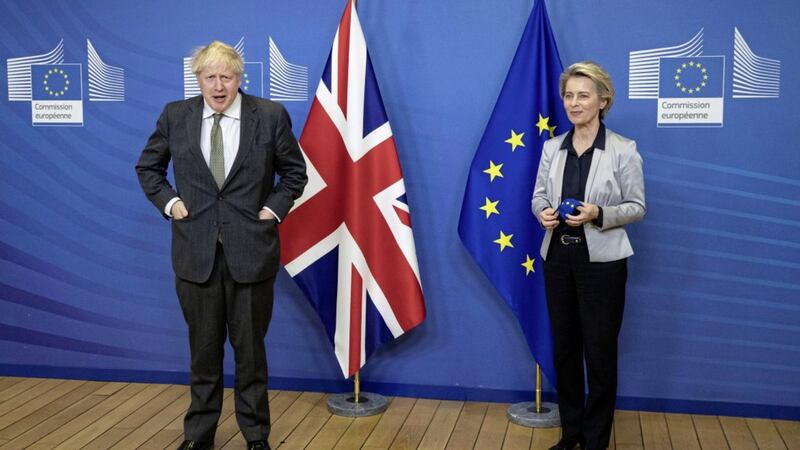Not for the first time, Ireland is being used as a pawn between two foreign powers arguing over who should rule England.
It happened before in 1690, when two kings, one English and one from the continent, fought in Ireland over the English crown and the Irish joined in on both sides.
In 2021 we are doing exactly the same, by taking sides in the current row between the EU and the UK, which began over which of them should govern Britain. Both are led by what might charitably be called bumbling political idiots, with imperial ambitions. Welcome to a re-enactment of the Battle of the Boyne.
Britain is headed by Boris Johnson, who in his own words, has suggested that it is acceptable, and sometimes desirable, to lie. Last year he visited hospitals, shaking hands and not wearing a mask, claiming that the virus would soon be gone. Britain now has over 100,000 virus-related deaths, the highest in Europe.
But if Johnson’s idiocy is well known in Ireland, Ursula von der Leyen’s is not. She is EU Commission President. The influential German magazine, Der Spiegel, last week said that VdL (as it called her) is only good at evading responsibility for incompetence. It reported that she blundered as German defence minister (the army was embarrassingly short of equipment), as family minister (every child was to get a hot school lunch daily, but it never happened) and as social affairs minister (promised funding for child care never materialised).
It was therefore no surprise that in buying vaccines, she was late, chaotic and stingy. Her blunders were made worse by her insistence on the EU ordering vaccines rather than individual (democratically elected) national governments.
Her plan failed, as evidenced by the fact that 11 per cent of the north’s population has been vaccinated through the UK, as opposed to only 3 per cent in the Republic, through the EU. (When you are less efficient than Boris Johnson, “bumbling” is perhaps too kind a description.)
So VdL blamed Britain, then AstraZeneca and finally opted to prevent the rest of the world (especially the UK) from obtaining the vaccine until the EU had enough for itself. This led her to try to close the Irish border, thereby betraying Irish nationalists and reflecting Boris Johnson’s betrayal of unionists when he established the Irish Sea border.
So today in Ireland we have the pathetic spectacle of two rival sectarian groups, pledging loyalty to one of two overseas leaders, both of whom have displayed a willingness to betray their Irish supporters. Like the war between James II and William III in 1690, the EU and UK are fighting in Ireland and the Irish, God help their wit, are again taking sides.
(Historians report that James was stiff, unpopular and not too bright. William was reserved, sometimes irritable and ungracious. These characteristics, of course, bear no resemblance to today’s two leaders.)
As part of the current conflict, the UK is trying to break up the EU and the EU is trying to break up the UK. History suggests that the Irish might reasonably support both causes. Instead they pledge rival loyalties to overseas powers, suggesting that unionists and nationalists suffer from an inferiority complex, requiring rule from abroad.
Maybe history has conditioned them that way, producing what are effectively two unionist groups, arguing over which political union is better. Few Irish now advocate self-governance through political independence. Instead we have two sets of unionists trying to use events here to gain advantage over their rivals.
Brexit illustrates the point. Both sought victory over where the border should be, rather than uniting against any border. But then the Irish have become incapable of ruling themselves by forbidding the sin of original thinking.
So perhaps 250 years from now, one side or the other will march annually to celebrate whatever the outcome of the current mess will be, shouting “Remember 2021.” That’s the problem with the Irish. They never learn.









